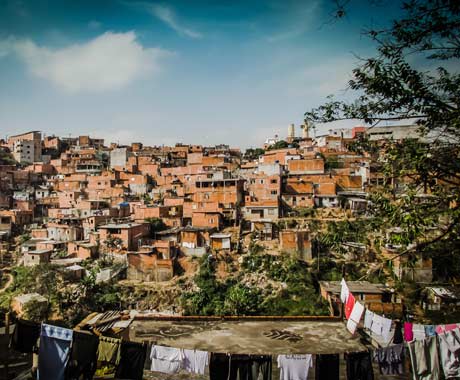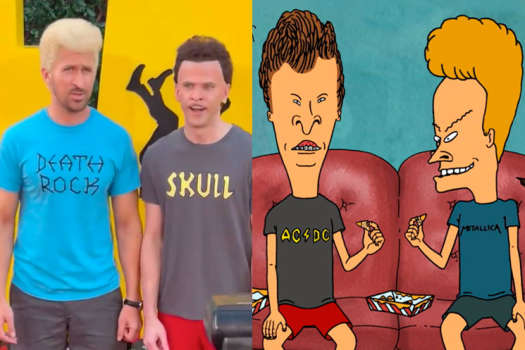What comes to mind when you hear the word "slum"? Probably nothing good. From its outset, Slums: Cities of Tomorrow gets a few common perception/actual reality situations out of the way.
Perception: Locales where slums exist are a world away. Reality: Slums: Cities of Tomorrow opens in Lakewood, New Jersey, in a place known as Tent City, which is 60 miles from New York City.
Perception: Slums and shantytowns are inner cities, or constructs on the outside of cities, and by extension, outside polite society. This can be true. But Orhon's interviewed experts discuss how slums and squatter communities were common in cities like New York, San Francisco, Seattle and London at the dawn of the 20th Century, and how, because settlements were so easy to destroy (and pave over), it's easy for history to forget this fact because there's nothing left to prove they were there.
Perception: Slums are desolate and dangerous places where hope is extinguished.
This is the silliest belief of all, yet one espoused by educated people I know. Slums are where a billion people live, and that number may well increase in coming years.
Rant:
I want to write way more about this film than I have space to do, so let me hit you with the main shit. People like you and I — somewhere between the upper-middle class and welfare — bitch about income inequality, but let's be real: we say that because we want (and think we need) bigger chunks, not so we can make it rain on the people who live in Tent City, in the favelas of Brazil and in the slums of Mangalore. This is at the root of what Jeremy Seabrook, the author of Pauperland calls "psychological poverty," and that is why the 1% exists — because it will never be enough for them, and it'll never be enough for us.
These folks living in slums, in so-called "squalor," they're ready, and they're able — more than I am, and probably more than you are.
End rant.
Orhon's Slums: Cities of Tomorrow is a sympathetic, thoughtful and interesting portrait of slums and of the people living in them. It depicts real people in real communities getting by with far less than you or I because they don't have a choice. It's inspiring and thought-provoking in a you-might-be-looking-at-your-future way, so watch it, be moved and learn something.
(Les Films du 3 Mars)Perception: Locales where slums exist are a world away. Reality: Slums: Cities of Tomorrow opens in Lakewood, New Jersey, in a place known as Tent City, which is 60 miles from New York City.
Perception: Slums and shantytowns are inner cities, or constructs on the outside of cities, and by extension, outside polite society. This can be true. But Orhon's interviewed experts discuss how slums and squatter communities were common in cities like New York, San Francisco, Seattle and London at the dawn of the 20th Century, and how, because settlements were so easy to destroy (and pave over), it's easy for history to forget this fact because there's nothing left to prove they were there.
Perception: Slums are desolate and dangerous places where hope is extinguished.
This is the silliest belief of all, yet one espoused by educated people I know. Slums are where a billion people live, and that number may well increase in coming years.
Rant:
I want to write way more about this film than I have space to do, so let me hit you with the main shit. People like you and I — somewhere between the upper-middle class and welfare — bitch about income inequality, but let's be real: we say that because we want (and think we need) bigger chunks, not so we can make it rain on the people who live in Tent City, in the favelas of Brazil and in the slums of Mangalore. This is at the root of what Jeremy Seabrook, the author of Pauperland calls "psychological poverty," and that is why the 1% exists — because it will never be enough for them, and it'll never be enough for us.
These folks living in slums, in so-called "squalor," they're ready, and they're able — more than I am, and probably more than you are.
End rant.
Orhon's Slums: Cities of Tomorrow is a sympathetic, thoughtful and interesting portrait of slums and of the people living in them. It depicts real people in real communities getting by with far less than you or I because they don't have a choice. It's inspiring and thought-provoking in a you-might-be-looking-at-your-future way, so watch it, be moved and learn something.




